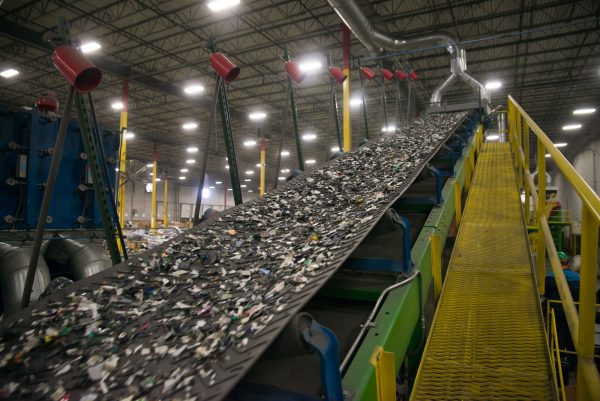
The use of recovered electronics parts in newer devices is not a new practice, but several industries are capitalizing on it in ways conducive to solving the e-waste crisis. With e-waste looming large as one of the biggest contributors to environmental pollution and health issues around the world, finding ways to recycle and recover what we can form it is a plus.
While a number of industries including electronics manufacturing and mining contribute to the e-waste crisis, a few also benefit from it in significant ways. The success of these industries is an important catalyst for the corresponding success of our ability to find solutions to the problems associated with amassing e-waste. In this post, we’ll take a look at what manufacturers around the world are doing with the gently used recovery from discarded e-waste.
Electronics recyclers play an important role in taking e-waste recovery to the next level, from merely stripping and shredding devices to carefully separating each recoverable component and preparing it for resale and reuse in the recovery market.
Urban Mining
Urban mining is, and will continue to be, a top beneficiary of e-waste recovery. Since the CEO of Electronic Recycler International first coined the term, the idea of turning our e-waste into profitable reprocessed sources of valuable material has taken on a number of potentially beneficial roles.
The urban mining landscape is currently shaping up to become a colorful world of new and exciting applications to the electronics recycling model. More and more are waking up to the fact that the recovering components of used or discarded electronics devices as well as reclaimed materials from construction sites can make a huge difference in cost and energy savings.
The advent of urban mining means that we are trending toward a world where growing sources of rare earth minerals and metals as well as more familiar metals like gold and silver are now readily available through electronics recycling. As we turn more and more to practices like urban mining and reuse, we could see a decline in the e-waste problem and an increase in more sustainable and environmentally-friendly ways to get dwindling materials into the hands of manufacturers that need them.
Electronics Repair
New concepts like the circular economy has made it clear that electronics repair is one viable and efficient way to keep electronic waste out of the waste stream. Keeping electronics repaired over longer periods of time, rather than tossing them into the nearest landfill or sending them for recycling with questionable destinations, could be the answer to ending our current global crisis.
In countries beyond the borders of the U.S., electronics repair is nothing new. Small repair shops are commonplace in regions of west Africa, India and China as well as many other parts of the developing world.
There is at least one downside, however. These repair systems often lack the coordination to overcome serious barriers and hindrances such as lack of ability to spot illegally shipped electronics. This further adds to the plight of these regions, traditionally dubbed as unfortunate receptors of more e-waste than they can feasibly handle.
Electronics Manufacturing
Of course, the electronics manufacturing industry is the first industry that comes to mind when we think of the overproduction of e-waste and the source of problems associated with e-waste build-up. Productions rates are only increasing as the demand for the latest, sleekest and most multifunctional devices continues to grow.
Certainly, the electronics manufacturing industry can benefit greatly from just a few adjustments to the end-of-life scenarios of most electronic devices. Its no secret that these devices contain a number of valuable and rare materials which can be re-used for the industry’s benefit. The main issue is developing methods and processes that complement materials recovery, and carefully implementing them until such solutions become just as commonplace as e-waste now is.
Consumers
The consumer industry can be described as the goods and services gained when individuals rather than manufacturers and businesses are doing the purchasing. The consumer goods sector, with its ability to make concrete choices about the amount and kind of electronics purchased year of year, stands to benefit greatly from e-waste recovery.
Recovered e-waste, reused to make refurbished electronic goods, can bring down manufacturing and consumer costs and can make devices, new and used, more accessible and affordable. It can also become an added convenience for those who prefer to have phones and devices repaired rather than upgraded. From a big picture point of view, e-waste recovery means a better and more sustainable economy and a better environment in which that economy can thrive.
Tech Industry
The tech industry (as distinguished from electronics manufacturers) also stands to gain from e-waste recovery. The Tech sector has been blooming and bursting rapidly over the past few decades, and while this growth is, in some ways, to blame for many of the e-waste crisis issues we face today, the tech industry could also benefit from its own proverbial messes.
Though it may take a considerable amount of time, the tech industry could become less reliant on new parts and machinery to power original devices and more dependant on e-waste for its common necessaries, including rare earth minerals and precious metals like gold, silver and platinum.
When these components of e-waste are carefully harvested, they provide environmentally friendly alternatives to methods such as traditional mining that both deplete dwindling resources and cause considerable harm to the environment.
E-waste Recovery Benefits by Industry
Various industries could benefit from e-waste recovery, and these industries, along with their corresponding interest in gaining from the potential bounties of e-waste, could play a significant role in bringing forward current electronics recycling efforts throughout the U.S. and abroad.
Thinking in terms of industry benefits provides an opportunity to explore alternatives to our current methods – methods which have produced a major e-waste crisis. When considering solutions, thinking from an industry benefits perspective could be the best approach.